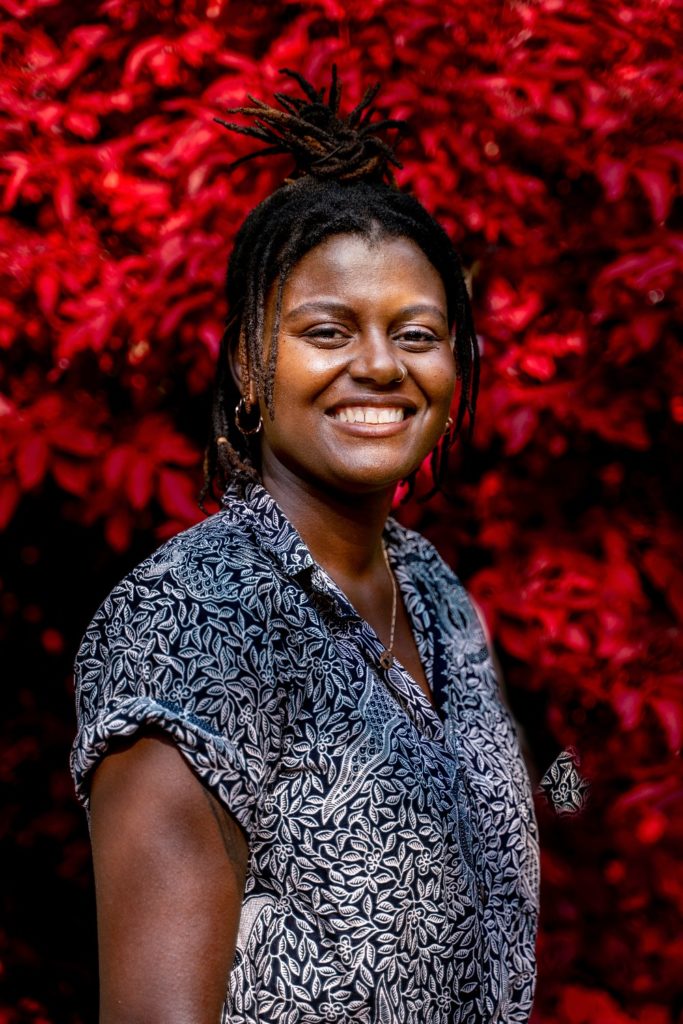Slate: Black Arts World unites actors and dancers who feel isolated in the predominantly white performing arts.
Words Haroon Ali / photos Bas de Brouwer
‘There are not enough roles for black performers.’ Dancer, singer and theatre director Perry Gits (28), who previously played in musicals such as Hair and Dreamgirls, gets straight to the point. ‘As a performer, I’m often labelled as urban. Now I do have a background in R&B and gospel music, but I don’t want to limit myself to these two genres, just because I’m black. I’ve practiced various styles over the years, but black performers will always be perceived differently. I don’t even mind the word urban, but the fact that I’m black adds a lot of subtext to it, as if dancing is just a hobby for me.’
The Grammy Awards recently stopped using ‘urban’ to describe music of black origin. ‘Finally’, says Gits. ‘Just appreciate someone’s unique talent, instead of labelling it.’ He doesn’t want to be type casted, so he produces his own plays, about being black, about being gay and his life in the southeast of Amsterdam, which has a significant black population. His play Je Lult explored different versions of masculinity, encouraging viewers to be themselves, regardless of their gender or sexuality. ‘I’m not just focusing on black pain and slavery, for an exclusively black audience.’
Priscilla Macintosh (35) was deeply moved by Je Lult, which roughly translates into ‘You’re full of shit’. She showcased his play on two different locations. ‘It was refreshing, confrontational and funny’, says the creative producer, who helps artists reach a wider audience. Gits and Macintosh joined forces and they now lead the Dutch chapter of Slate: Black Arts World, a two-year project that aims to increase the visibility of black professionals in the European performing arts, in collaboration with the ICK Amsterdam dance collective and De Meervaart theatre.

Learn to say no
Macintosh’s family is from Suriname; Gits’ roots lie in Ghana. He says he chooses his words wisely, while she’s more direct. But despite these differences, they share the same experiences. The duo feels that black artists and performers have to work harder to prove their talents. ‘You’re usually the only black person in a cast’, says Gits. That’s why Slate organises meetings and workshops for black professionals, so they can share their experiences in a safe environment. This often triggers intense emotions that have been building up for years, mostly about ‘microaggressions’ at work.
‘The art sector has been trying to be more inclusive for years – in its own way’, says Macintosh. ‘So our goal is not to be discovered. There is more than enough talent and most of us do find work. But we give performers tools to stay fresh and focused in this industry.’ Despite some positive changes, art is still being viewed through a Western lens. ‘We help black professionals to understand these systems and institutions, so that they can learn to navigate them. We teach them to be confident about their own work and to say: this is what I have to offer, take it or leave it.’
Mental health is also high on the agenda. ‘Creatives work in a pressure cooker and they have to keep going, no matter what’, says Gits. ‘But you need to be aware of your own limitations and learn to say no when the pressure gets too much. That’s hard, because there is usually just one role in a play that fits black performers, so we all compete for the same part. Every audition feels like the one and only chance, every single time. That’s why you never want to say no when you get the part, or even take a day off from your busy schedule, but you need to respect your personal boundaries as well.’
Calling the shots
Getting the part or another creative job is challenging. But it’s even harder for artists of colour to reach the top and influence policies. ‘A lot of cultural organizations practice window dressing’, says Macintosh. ‘You’ll see a few colourful pawns on stage, in the spotlight for outsiders to see, but these people don’t have any real influence on the company. It can still be an unsafe environment for them, especially when co-workers keep making racist remarks or jokes when no one is watching.’
‘We need to see more diversity and inclusivity in the boardroom, not just on stage’, Gits emphasises. ‘There are so many black professionals working in the arts, but they’re still not welcome on high level committees, and I don’t see them calling the shots during auditions. So how are you supposed to feel valued and respected as a black actor or dancer, when you don’t see anyone with your skin colour making the important decisions? Meanwhile, we still have to battle the biases and prejudices of white people, who constantly remind us that we’re not the norm but the exception.’
Gits is also annoyed that black actors still have to play stereotypical roles in shows and plays, roles that perpetuate these biases about race. ‘Look at them, poor black people, they have so much pain and sorrow! But you don’t have to feel sorry for me, or Priscilla. We’re not just defined by racism and social injustice. I also don’t believe that it’s our sole responsibility to shed light on these troubling issues.’ Macintosh: ‘If black artists want to tell those stories, fine. But it becomes a problem when white people force you to play the victim, without taking responsibility for their own actions.’
During the Slate residency in Amsterdam, Gits directed a performance. ‘I tried to involve the entire group. Not just professional performers, but also a creative producer like Priscilla. Everyone has a story to tell, especially if you have a bicultural identity. You don’t need any training to share that personal story in a genuine way, but it’s my job as a director to guide people. Priscilla, for example, needed to feel comfortable on stage first, before she could let herself go completely.’ This way, participants take control over their own narrative and decide how they want to share it.

Eradicate racism
Slate doesn’t exist in a bubble. For the past few months, there have been mass protests against police brutality and the disproportional use of violence against black citizens. Black Lives Matter, a movement that started in 2013 in the United States, has spread across the globe and also ignited a debate about systemic racism in the Netherlands. It gives Slate some momentum, and more urgency. ‘I’m glad that both black and white people are speaking up and taking a closer look at their own behaviour’, says Macintosh. ‘Including people who used to avoid the conversation about racism.’
But Gits is on the fence, wondering if Black Lives Matter will ever lead to actual, sustainable change. ‘It was a big hype on social media, but I hope the movement continues beyond that, in the real world. I experience this broken system every day of my life. Racism has always existed and I will always have to deal with it. People outside the arena of media actually need to do something. They have to challenge systemic racism, not just by protesting or posting on Instagram. We’re all human beings, so we should look after each other and eradicate this stain on humanity.’
The never-ending stream of clips and cries on social media can be painful to watch, says Macintosh. ‘I’m happy that so many people are sharing their experiences with racism, and their pain, but it does affect you as a viewer. As a black person, you used to get the information you need from certain reliable sources. But now it’s everywhere, so it’s hard to filter all this loud content. I also feel that companies and white influencers use the fight against racism to improve their own image, because it’s good PR for them. But I want people to tackle racism in their everyday lives.’
Complex conversations
Slate specifically focuses on people of colour. The group doesn’t feel inclined to educate white people about racism and social injustice. Gits: ‘Sometimes, people bother me at 10 PM, asking me about my thoughts or experiences, because I might be the only black person they know. But I’d suggest they do their homework first.’ Macintosh: ‘A lot of people will approach you to show solidarity. But sometimes, comments that are made with the best intentions are still hurtful. That’s why I refer white Dutch people to the website withuiswerk.nl, which is a great resource on racism.’
However, Slate: Black Arts World is not only representing black artists. ‘That’s a bit of a touchy issue’, says Macintosh. ‘It also sparked some debate within our group. Can you call anyone black? We use black as a political label, following our Slate colleagues in the United Kingdom. According to their definition, anyone who’s not white is called black, meaning anyone who experiences disadvantage because of his or her skin colour. It does make our conversations more complex, because a black person and a brown person usually have very different experiences when it comes to racism.’
But Slate is well aware of the environment it operates in. Cultural partners ICK Amsterdam and De Meervaart are based in the westernmost part of Amsterdam, where 50 percent of the local population has foreign roots, mostly from Morocco and Turkey. ‘It makes sense for us to broaden our horizon a bit’, says Macintosh. ‘We want to tackle issues that affect all marginalized groups in a predominantly white nation, where many people can’t find work because of their foreign sounding name.’ So, Slate’s ambitions are always expanding. Gits: ‘And our job is never done.’



0 Comments